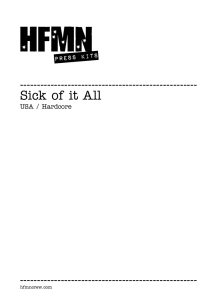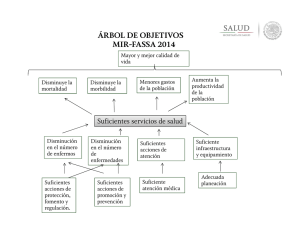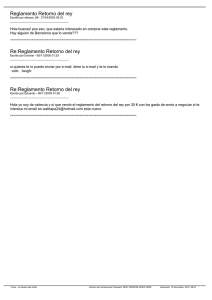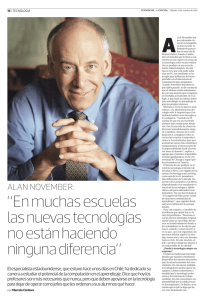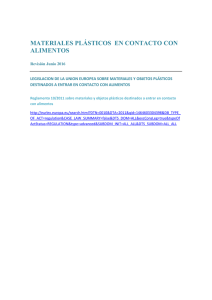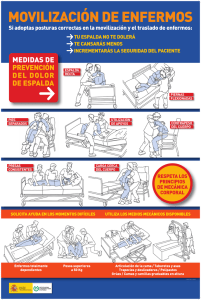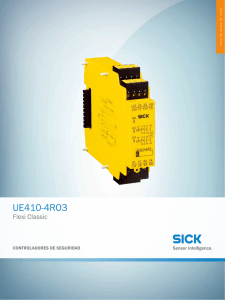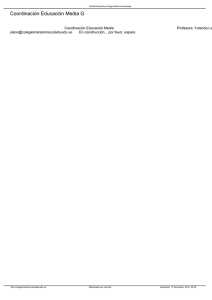“If, we have died with Christ, we believe that we shall also live with
Anuncio
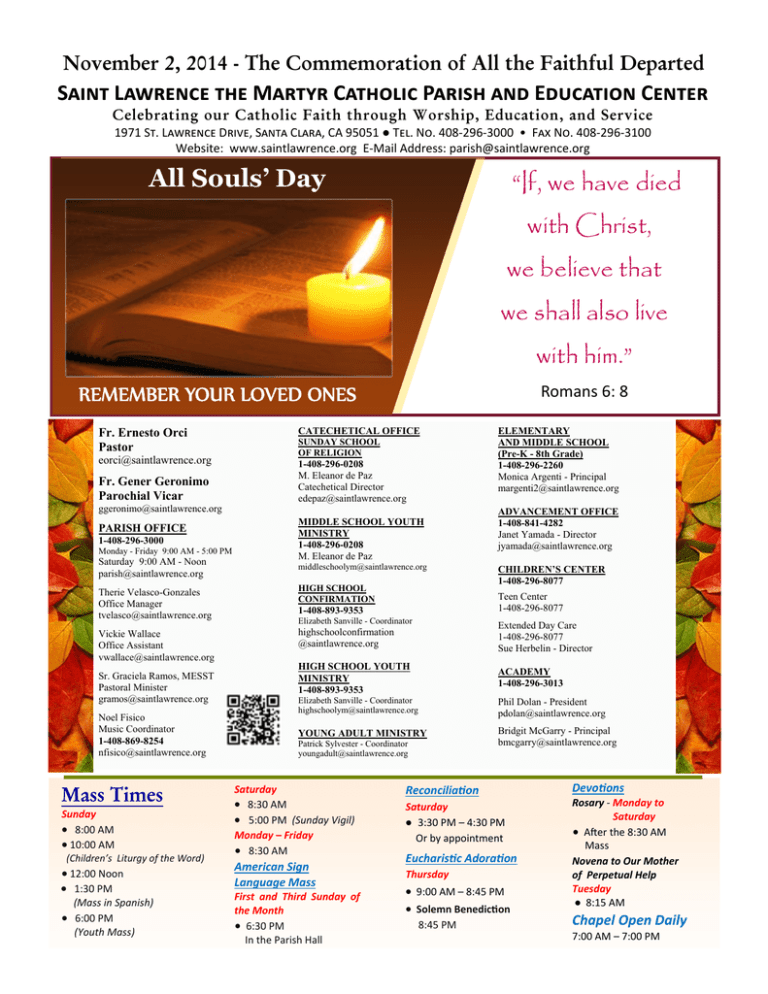
November 2, 2014 - The Commemoration of All the Faithful Departed S L M C P E C Celebrating our Catholic Faith through Worship, Education, and Service 1971 S . L D ,S C , CA 95051 ● T . N . 408-296-3000 • F N . 408-296-3100 Website: www.saintlawrence.org E-Mail Address: [email protected] All Souls’ Day “If, we have died with Christ, we believe that we shall also live with him.” REMEMBER YOUR LOVED ONES Fr. Ernesto Orci Pastor [email protected] Fr. Gener Geronimo Parochial Vicar [email protected] PARISH OFFICE 1-408-296-3000 Monday - Friday 9:00 AM - 5:00 PM Saturday 9:00 AM - Noon [email protected] Romans 6: 8 CATECHETICAL OFFICE SUNDAY SCHOOL OF RELIGION 1-408-296-0208 M. Eleanor de Paz Catechetical Director [email protected] MIDDLE SCHOOL YOUTH MINISTRY 1-408-296-0208 M. Eleanor de Paz [email protected] ELEMENTARY AND MIDDLE SCHOOL (Pre-K - 8th Grade) 1-408-296-2260 Monica Argenti - Principal [email protected] ADVANCEMENT OFFICE 1-408-841-4282 Janet Yamada - Director [email protected] CHILDREN’S CENTER 1-408-296-8077 Therie Velasco-Gonzales Office Manager [email protected] HIGH SCHOOL CONFIRMATION Vickie Wallace Office Assistant [email protected] highschoolconfirmation @saintlawrence.org Extended Day Care 1-408-296-8077 Sue Herbelin - Director HIGH SCHOOL YOUTH MINISTRY 1-408-893-9353 ACADEMY 1-408-296-3013 Elizabeth Sanville - Coordinator [email protected] Phil Dolan - President [email protected] YOUNG ADULT MINISTRY Bridgit McGarry - Principal [email protected] Sr. Graciela Ramos, MESST Pastoral Minister [email protected] Noel Fisico Music Coordinator 1-408-869-8254 [email protected] Mass Times Sunday 8:00 AM 10:00 AM (Children’s Liturgy of the Word) 12:00 Noon 1:30 PM (Mass in Spanish) 6:00 PM (Youth Mass) Teen Center 1-408-296-8077 1-408-893-9353 Elizabeth Sanville - Coordinator Patrick Sylvester - Coordinator [email protected] Saturday 8:30 AM 5:00 PM (Sunday Vigil) Monday – Friday 8:30 AM American Sign Language Mass First and Third Sunday of the Month 6:30 PM In the Parish Hall Reconcilia on Devo ons Saturday ● 3:30 PM – 4:30 PM Or by appointment Rosary - Monday to Saturday A er the 8:30 AM Mass Novena to Our Mother of Perpetual Help Tuesday ● 8:15 AM Eucharis c Adora on Thursday 9:00 AM – 8:45 PM Solemn Benedic on 8:45 PM Chapel Open Daily 7:00 AM – 7:00 PM By: Jim Balquist By: Deborah Ferry Doctors Without Borders All Souls’ Day In each of our lives, there occasionally enters an example of all that is good. Today, it is Doctors Without Borders; the 1999 recipient of the Nobel Peace Prize and the global leader in the fight against Ebola. Today, they are men oned o en. These are medical workers who could make much more money and live more comfortably and a lot more safely somewhere else, but chose a humanitarian path less travelled – “ministering” to those who the world forgot even though Catholic Social Teaching and the United Na ons prescribes adequate health care as a basic human right. Unfortunately, too many live in situa ons where: 1) Either there is no prac cal func onal government to fill this need, 2) The government cannot afford to support this need, or any of a variety of other less fla ering reasons. Ebola vic ms in this world pray to God for help … as we know, God usually does not become directly involved in these appeals but acts through the humanity He has created. In this case, I visualize that God asked Doctors Without Borders to take the lead and perhaps they first responded: “Why us Lord?” Then God said “because I enabled you and no one else will stand up. If you don’t help here, nobody will and more people will die.” … and they agreed. It is hard to visualize all they do and why they do it. The personal sacrifice seems incredible. It is not just inconvenient and uncomfortable … there is a real risk of dying. They chose to put their “boots on the ground” while others choose to safely stay in their safe warm offices in their Gucci shoes and appear to lead from afar. Let us recognize and honor Doctors Without Borders today and give thanks to the God who created and endowed them with their characteris cs and their poten al. And, of course, let us reflect on our own God-given capabili es and poten al and listen for God’s call.. Who knows; maybe the next ar cle will be about you. The commemora on of all the faithful departed is celebrated by the Church on 2 November. The Office of the Dead must be recited by the clergy and all the Masses are to be of Requiem, except one of the current feast, where this is of obliga on. The theological basis for the feast is the doctrine that the souls which, on depar ng from the body, are not perfectly cleansed from venial sins, or have not fully atoned for past transgressions, are debarred from the Bea fic Vision, and that the faithful on earth can help them by prayers, almsdeeds and especially by the sacrifice of the Mass. In the early days of Chris anity, the names of the departed brethren were entered in the diptychs. Later, in the sixth century, it was customary in Benedic ne monasteries to hold a commemora on of the deceased members at Whitsun de. In Spain, there was such a day on Saturday before Sexagesima or before Pentecost, at the me of St. Isidore (d. 636). In Germany, there existed (according Widukind, Abbot of Corvey, c. 980) a me-honored ceremony of praying to the dead on 1 October. This was accepted and sanc fied by the Church. St. Odilo of Cluny (d. 1048) ordered the commemora on of all the faithful departed to be held annually in the monasteries of his congrega on. Thence, it spread among the other congrega ons of the Benedic nes and among the Carthusians. Of the dioceses, Liège was the first to adopt it under Bishop Notger (d. 1008). It is then found in the martyrology of St. Protadius of Besançon (1053-66). Bishop Otricus (1120-25) introduced it into Milan for the 15 October. In Spain, Portugal, and La n America, priests on this day say three Masses. A similar concession for the en re world was asked of Pope Leo XIII. He would not grant the favor but ordered a special Requiem on Sunday, 30 September, 1888. Excerpted from the Catholic Encyclopedia November 2, 2014 — The Commemoration of All the Faithful Departed — Page 2 Saint Lawrence Elementary and Middle School does not unlawfully discriminate on the basis of race, color, national or ethnic origin, age, sex, or disability in the admission of students, the administration of educational policies, scholarship, and loan programs, and athletic and other school-administered programs. November 2, 2014 — The Commemoration of All the Faithful Departed — Page 3 The Commemoration of All the Faithful Departed (All Souls' Day) Daylight Savings Time Ends Wisdom 3: 1-9 / Romans 5: 5-11 or Romans 6: 3-9 / John 6: 37-40 (668) 8:00 AM All Souls' Novena + Adelaida and + Telesforo Trias + Fred Schwehr + Maria Mendonca + Beth Cueto and Rillon Family + Maria Amutan 10:00 AM All Souls' Novena 12:00 PM All Souls' Novena Carrol Hunter - Happy Birthday Mita Macasaet - Happy Birthday + Natalia Ventura Andrew Kalt and Diana Kalt Departed Members of the Legion of Mary 1:30 PM All Souls' Novena 6:00 PM All Souls' Novena November 3, 2014 Monday Weekday ( Thirty - First Week in Ordinary Time) Saint M artin De Porres, Religious Philippians 2: 1-4 / Luke 14: 12-14 (485) 8:30 AM All Souls' Novena November 4, 2014 Tuesday Saint Charles Borromeo, Bishop Philippians 2: 5-11 / Luke 14: 15-24 (486) 8:30 AM All Souls' Novena November 5, 2014 Wednesday Weekday Philippians 2: 12-18 / Luke 14: 25-33 (487) 8:30 AM All Souls' Novena November 6, 2014 Thursday Weekday Philippians 3: 3-8a / Luke 15: 1-10 (488) 8:30 AM All Souls' Novena November 7, 2014 Friday Weekday Philippians 3: 17 -- 4: 1 / Luke 16: 1-8 (489) 8:30 AM All Souls' Novena November 8, 2014 Saturday Weekday - BVM Philippians 4: 10-19 / Luke 16: 9-15 (490) 8:30 AM All Souls' Novena 5:00 PM All Souls' Novena November 9, 2014 Sunday The Dedication of the Lateran Basilica; Stewardship Sunday Ezekiel 47: 1-2, 8-9, 12 / 1 Corinthians 3: 9c-11, 16-17 / John 2: 13-22 (671) November 2, 2014 Sunday Luck of St. Lawrence Lottery is Back! Tickets Are Available at the Parish Of ice. The Result of October 31, 2014 drawing for a $200 Prize will be published in next week’s bulle n. The next drawing will be on November 26, 2014 for a $500 Prize. Remember that each cket you buy now gives you 8 chances to win. Please return your sold cket stubs with payment to the Parish Office since the sooner you turn in your sold ckets, the more chances you have to win the prizes money. You can be The next Lucky winner November 2, 2014 — The Commemoration of All the Faithful Departed — Page 4 THANKSGIVING DONATIONS This year, we are collec ng food dona ons on Sunday, November 23rd, a er the 8:00 AM, 10:00 AM, and 12 Noon Masses. Sign-ups for dona ons will be at all Masses on November 8 and 9, and November 15 and 16. Items needed are CANNED cranberry sauce, Green Beans or Corn, Fruit Cocktail, Yams, Canned/packaged Turkey Gravy, Frozen Turkeys or $10 Grocery Store Gi Cards or cash/check contribu ons. Saint Lawrence parishioners have always been very generous in this collec on and we thank you in advance for your dona on this year. We take all dona ons to Saint Jus n’s where Santa Clara residents can receive a Thanksgiving dinner to prepare at their home. People who call Saint Lawrence’s St. Vincent de Paul’s Society for Thanksgiving baskets are referred to Saint Jus n’s Parish. Saint Jus n’s is preparing to give over 750 families all the trimmings for their Thanksgiving Meal. If you know a family who could benefit from the gi of a Thanksgiving Meal to cook at their home, please have them call Saint Lawrence St. Vincent de Paul (SVdP) at 1-408-296-3000. If you have any ques ons, feel free to call 1-408-296-3000 and leave a message on the SVdP line. All Saints' Day All Souls “On the Feast of All Souls we pray for those who have gone before us and stand in judgment before God. May we share with one another the treasure of love’s memory, and console one another with the assurance of resurrec on.” Día de Todas las Almas “En la Fiesta de Todas las Almas rezamos por los que se han ido antes que nosotros y se encuentran ante el juicio de Dios. Que podamos compar r el uno con el otro el tesoro de los recuerdos del amor, y consolar los unos a los otros con el aseguramiento de la resurrección.” $ 10/25/2014 - Saturday 5:00 PM 10/26/2014 - Sunday 8:00 AM 10:00 AM 12:00 PM 1:30 PM 6:00 PM Mail In ACH/CC Total Stewardship Offering Goal - Stewardship Variance 25.00 $ 1,181.00 November 16, 2014 Fund for Church Loan payments and Maintenance November 23, 2014 Campaign for Human Development Year-To-Date Stewardship $165,558 Actual YTD Variance ($19,412) $184,970 $- $20,000 $40,000 Saint Lawrence the Martyr Infinity High School Youth Ministry 2014-2015 FOCUS THEME: “ The Holy Mass ” Sunday, November 9, 2014 3:30 PM– 5:30 PM Sunday Best: The Necessity of Worship Parish Hall For more info: Contact Cateche cal Ministries (408) 296-0208 [email protected] Educa on Center July 1, 2014 - October 27, 2014 Goal Excerpt from Stewardship By The Book by: Sharon Hueckel November 9, 2014 $ 1,387.85 $ 1,377.54 $ 985.76 $ 675.60 $ 1,227.65 $ $ $ 6,860.40 $ 8,000.00 $ (1,139.60) $60,000 $80,000 $100,000 $120,000 $140,000 $160,000 $180,000 $200,000 Please Join us for Pancake Breakfast after Mass. Pancake Breakfast Sponsored by the Knights of Columbus Sunday, November 2, 2014 A er the 8:00 AM and 10:00 AM Masses Parish Hall Thank you very much! November 2, 2014 — The Commemoration of All the Faithful Departed — Page 5 PASTORAL CARE AND MINISTRY TO THE SICK AND HOMEBOUND By: Fr. Gener Geronimo Part I: The Sacrament of Anointing of the Sick What is the Sacrament of Anointing of the Sick? The Sacrament of Anointing of the Sick is “the conferral of a special grace on the Christian experiencing difficulties inherent in the condition of grave illness or old age.” (CCC,1527) “And wherever he went--into villages, towns or countryside--they placed the sick in the marketplaces. They begged him to let them touch even the edge of his cloak, and all who touched him were healed.” (Luke 5:15) Jesus was concerned about the physical health of people, as well as their spiritual health. In fact, the word “salvation” is derived from the Latin salus, which means “health.” By healing people’s bodies as well as their souls, Jesus showed that the entire human being is touched by God’s salvation. The classical description that the Bible gives, however, to this sacrament is found in the Letter of St. James: “Are you among the sick? They should call for the priests of the Church and have them pray over them, anointing them with oil in the name of the Lord. The prayer of faith will save the sick, and the Lord will raise them up; and anyone who has committed sins will be forgiven.” (James 5:14-15) How is the Rite of Anointing celebrated? (1) The Rite of Anointing is celebrated along with the Liturgy of the Word to instruct those gathered for the sacrament on the deeper Christian meaning of sickness and celebrate the sacrament in renewed faith. (2) This is followed by the laying on of hands in silence, which is an ancient Christian gesture. (3) Next, the blessing of, or thanksgiving over, the oil of the sick is given. As the oil is rubbed and absorbed into the skin, so does the Holy Spirit “enter” the sick person, claiming, empowering, enlivening, and rejuvenating in the name of Jesus Christ. (4) The final step is the actual anointing, which is done to the head and to the hands: Rubbing of Oil on the Forehead: because there the sign of the cross was first traced at baptism and confirmation; Rubbing of Oil on the Hands: signifies the Holy Spirit meeting us in our personal situation, in our own particular sickness with its unique set of feelings: pain, resentment, denial, acceptance, or even joy, the anointing oil will bring Jesus the healer to us in our special circumstances. When is the Sacrament of the Anointing of the Sick conferred? Not long ago anointing of the sick was mostly conferred to those close to death. Calling for a priest to administer “extreme unction,” as it was then called, indicated that the doctor did not give the patient long to live. The Second Vatican Council restored this sacrament to its original purpose. They changed the name from Extreme Unction to Anointing of the Sick. “It is not a sacrament intended only for those who are at the point of death. Hence, it is certain that as soon as any of the faithful begins to be in danger of death from sickness or old age, this is already a suitable time for them to receive this sacrament.” (Vatican II, Sacred Liturgy, 73) What are the graces of the Sacrament of Anointing of the Sick? In common with all the sacraments, Anointing of the Sick confers sanctifying grace. It intensifies in the soul that supernatural life, that oneness with God, which is the source of all spiritual strength. The other special graces of the sacrament are to comfort and to strengthen the interior life of the sick person. The sacrament: quiets anxiety and dissipated fear; enables the sick person to embrace God’s will and to face the possibility of death without apprehension; gives the soul the strength to face and conquer whatever temptations to doubt, despondency, or even despair may mark Satan’s last effort to seize the soul for himself. Who administer the Sacrament of the Anointing of the Sick? Priests are the only ones who can sacramentally anoint the sick. Ministry to the sick, however, is recognized as a concern of the entire Christian community, not just the priest. Many persons experience both spiritual and physical healing when others pray over them and ask God to heal them. November 2, 2014 — The Commemoration of All the Faithful Departed — Page 6 Part II: Communion of the Sick What is Communion of the Sick? 2. “In bringing communion to the sick, it represents Christ and manifests faith and charity on behalf of the whole community toward those who cannot be present at the Eucharist. For the sick person the reception of Communion is not only a privilege but also a sign of support and concern shown by the Christian Community for its members who are ill.” (Communion in Ordinary Circumstances) Ideally, Catholics approach the Eucharist during the Holy Sacrifice of the Mass. However, if sickness deprives the individual of all his or her energy to participate in the Holy Sacrifice of the Mass, the Church is obliged to meet the spiritual needs of her faithful. From these needs arise the Church’s ancient pastoral practice of visiting the sick. This practice includes taking the Eucharist to the elderly, the sick, the infirm and the homebound. It involves Who administer the Communion of the Sick? sharing in prayer and the Word of God during these visits. These Eucharistic visits may take place in the home, at the 1. Ordinarily, the Church entrusts bishops, priests and deacons with ministry of taking Holy Communion to the hospital bed, or in any institution that provides basic care sick. Thus clergy are Ordinary Ministers of Holy and day-to-day living arrangements to the elderly, the Communion. sick, the infirm and the homebound. 2. When a layperson takes the Eucharist to the sick, he or she How is Communion of the Sick celebrated? acts as an Extraordinary Minister of Holy Communion. In other words, he or she acts in an extraordinary capacity The outline gives us an idea on how Communion of the because the priests and deacons are unable to meet the Sick is celebrated: needs of all the Faithful. 1. Introductory Rite 3. An Extraordinary Minister of Communion to the Sick may a. Greeting either exercise the ministry delegated either on a regular b. Sprinkling with Holy Water basis or temporarily due to a particular circumstance. c. Penitential Act 2. Liturgy of the Word What are the requirements to become an 3. Liturgy of Holy Communion Extraordinary Minister of Communion to the Sick? 4. Concluding Rite 1. He or she must be competent in the tasks of the ministry, who a. Blessing When is Communion of the Sick provided? show the maturity required to perform the tasks with dignity and grace. 2. In the Diocese of San José, Communion ministers must be According to the instruction on Communion in Ordinary fully initiated (through the celebration of baptism, Circumstances, “Priests with pastoral responsibilities confirmation, and Eucharist) and a practicing Catholic and in should see to it that the sick or aged, even though not full communion with the Catholic Church. seriously ill or in danger of death, are given every 3. He or she must be a registered parishioner of Saint Lawrence opportunity to receive the Eucharist frequently, even the Martyr Parish and applies to become an Extraordinary daily, especially during Easter time. They may receive Minister of Communion to the Sick either on a regular or Communion at any hour. Those who care for the sick may temporary basis. receive Communion with them, in accord with the usual 4. Extraordinary Ministers of Holy Communion to the Sick norms.” should receive sufficient spiritual, theological, and practical What is the grace received in Communion of the Sick? preparation to fulfill their role with knowledge and reverence. 1. First, the sick person experiences the presence and the 5. In all matters such Extraordinary Ministers of Communion to compassion of Jesus who reminds us that God’s the Sick should follow the guidelines of the Diocese of San self-communication to the sick is always real and Jose (such as fingerprinting and completing “shield the total—not just to the body, not just to the spirit, but to vulnerable” training). the whole of the person. Are You Called To Become An Extraordinary Minister Of Holy Communion To The Sick? Please complete the form and return to the Parish Office or e-mail to Jessie Garibaldi of the Ministry to the Sick and the Homebound at: [email protected]. You will be contacted for a date of formation and training. Name: _________________________________________________ Telephone/Mobile Number: ( ) ________ - ___________ Home Address: _________________________________________ E-Mail: ________________________________________________ City_____________________State_____Zip______________ Signature: ______________________________________________ November 2, 2014 — The Commemoration of All the Faithful Departed — Page 7 PASTORAL DE LA SALUD Y MINISTERIO A LOS ENFERMOS O IMPEDIDOS Por: Padre Gener Geronimo I Parte: El Sacramento de la Unción de los Enfermos ¿Qué es el Sacramento de la Unción de los ¿Cuándo se administra el Sacramento de la Unción enfermos? de los Enfermos? El sacramento de la Unción de los enfermos es "la concesión de una gracia especial al cristiano que experimenta las dificultades inherentes al estado de enfermedad grave o de la vejez." (CIC, 1527) No hace mucho tiempo, la unción de los enfermos se confería sólo a las personas cercanas a la muerte. Se llamaba a un sacerdote para administrar la "Extremaunción", así se llamaba este sacramento entonces, indicando que el médico no daba al paciente mucho tiempo de vida. El Concilio Vaticano II restauró este sacramento para su propósito original. Se cambió el nombre de Extremaunción por la Unción de los Enfermos. "No es un sacramento sólo para aquellos que están a punto de morir. Por lo tanto, el tiempo oportuno para recibirlo comienza cuando el cristiano ya empieza a estar en peligro de muerte por enfermedad o vejez, este es el momento adecuado para recibir el sacramento." (Vaticano II, la Sagrada Liturgia, 73) " Su fama se extendía cada vez más y una numerosa multitud afluía para oírle y ser curados de sus enfermedades. Y donde quiera que fuera - aldeas, ciudades o caseríos - colocaban a los enfermos en las plazas. Y le suplicaban que les permitiera tocar siquiera el borde de su manto, y todos los que lo tocaban, quedaban curados." (Lucas 5:15) Jesús se preocupaba tanto de la salud física de las personas, como de la espiritual. De hecho, la palabra "salvación" se deriva del latín “salus” que significa "salud". Al sanar los cuerpos de las personas, y sus almas, Jesús mostró que Dios ¿Qué gracias confiere el sacramento de la Unción salva al ser humano en su totalidad. de los enfermos? La descripción clásica que la Biblia nos da de este Como todos los sacramentos, la Unción de los Enfermos sacramento se encuentra en la carta de Santiago: "¿Está confiere la gracia santificante. Intensifica en el alma la enfermo alguno entre ustedes? Llame a los sacerdotes vida sobrenatural que nos une con Dios, que es la fuente de la Iglesia, que oren sobre él y le unjan con óleo en el de la fortaleza espiritual. nombre del Señor. Y la oración de la fe salvará al enfermo, y el Señor hará que se levante, y si hubiera Las otras gracias especiales del sacramento son consolar y fortalecer la vida interior de la persona enferma. El cometido pecados, le serán perdonados” (Santiago 5: 14-15). sacramento: disminuye la ansiedad y disipa los miedos; ¿Cómo se celebra el Rito de la Unción de los ayuda al enfermo a aceptar la voluntad de Dios y a enfrentar la posibilidad de la muerte sin temor. Es un don Enfermos? particular del Espíritu Santo que renueva la confianza y la (1) El Rito de la Unción se celebra con la Liturgia de la fe en Dios y fortalece contra las tentaciones del maligno, Palabra para instruir a los que se han reunido para el especialmente la tentación de desaliento y angustia ante la sacramento, en el sentido cristiano más profundo de la muerte. enfermedad, y celebrar el sacramento renovando nuestra fe. (2) Le sigue la imposición de las manos en silencio, que es un antiguo gesto cristiano. (3) A continuación, la bendición, o acción de gracias, del óleo de los enfermos que se va a imponer. A medida que el sacerdote unge con el óleo y este se absorbe en la piel, el Espíritu Santo "entra" en el enfermo, fortaleciéndole, dándole vida, y sanación en el nombre de Jesucristo. (4) El paso final es la unción concreta, en la frente y en las manos: Se unge la frente: porque nos marcaron con la señal de la cruz por primera vez en el bautismo y la confirmación. Ungir las manos con el aceite: significa que el Espíritu Santo viene a nuestra situación personal concreta, nuestra propia enfermedad particular con nuestros propios sentimientos: el dolor, el resentimiento, la negación, la aceptación, o incluso la alegría; el aceite de la unción nos trae a Jesús, el sanador, en nuestras circunstancias especiales. ¿Quién es el Ministro del sacramento de la Unción de los enfermos? Sólo los sacerdotes (presbíteros y obispos) pueden administrar el sacramento de la Unción de los Enfermos. Sin embargo el Ministerio a los Enfermos, debe ser una preocupación no sólo del sacerdote sino de toda la comunidad cristiana. Muchas personas experimentan la sanación espiritual y física cuando otros oran por ellos y piden a Dios que los sane. Unción de los Enfermos November 2, 2014 — The Commemoration of All the Faithful Departed — Page 8 II Parte: Comunión de los Enfermos ¿Qué es la comunión de los enfermos? 2. "‘Al llevar la comunión a los enfermos, el ministro representa a Cristo y manifiesta la fe y la caridad en nombre de toda la comunidad hacia los que no pueden estar presentes en la Eucaristía. Para la persona enferma la recepción de la Comunión no es sólo un privilegio, sino también un signo de apoyo que muestra la preocupación y unión de la comunidad cristiana por sus miembros enfermos”. (Comunión en circunstancias ordinarias) Lo ideal sería que los católicos se acerquen a la Eucaristía durante el Santo Sacrificio de la Misa. Sin embargo, si la enfermedad impide a las personas participar en el Santo Sacrificio de la Misa, la Iglesia tiene la obligación de atender las necesidades espirituales de sus fieles. Teniendo en cuenta estas necesidades surgió la antigua práctica pastoral de la Iglesia de visitar a los enfermos y ¿Quién es el Ministro de la Comunión de los llevar la Eucaristía a los ancianos, a los enfermos y a los Enfermos? confinados en sus casas. Se trata de hacer oración y compartir la Palabra de Dios. Estas visitas eucarísticas 1. Ordinariamente, la Iglesia encomienda a los obispos, sacerdotes y diáconos el ministerio de llevar la comunión a pueden ser en la casa, en la cama de un hospital, o en los enfermos. Ellos son los Ministros Ordinarios de la cualquier institución dedicada a ayudar a los ancianos, Sagrada Comunión. enfermos o inválidos. 2. Cuando un laico lleva la Eucaristía a los enfermos, actúa como Ministro Extraordinario de la Sagrada Comunión. En otras palabras, actúa en una capacidad extraordinaria porque Este esquema nos da una idea de cómo se celebra la los sacerdotes y diáconos no pueden cubrir todas las Comunión de los Enfermos: necesidades de los fieles. ¿Cómo se celebra la comunión de los enfermos? 1. Rito introductorio a. Saludo b. Aspersión con agua bendita c. Acto Penitencial 2. Liturgia de la Palabra 3. Liturgia de la Santa Comunión 4. Rito de Conclusión a. Bendición ¿Cuándo se administra la Comunión a los Enfermos? 3. Un Ministro Extraordinario de la Comunión a los Enfermos puede ejercer el ministerio como delegado, ya sea de forma regular o temporalmente, debido a una circunstancia particular. ¿Cuáles son los requisitos para ser Ministro Extraordinario de la Comunión de los Enfermos? 1. La persona debe ser competente en las tareas del ministerio, y mostrar la madurez necesaria para realizarlas con dignidad y gracia. 2. En la Diócesis de San José, los Ministros de la Comunión deben haber recibido los Sacramentos de Iniciación (el Bautismo, la De acuerdo con la instrucción de la Comunión en circunstancias Confirmación y la Eucaristía) y ser un católico practicante y en ordinarias, "Los sacerdotes con responsabilidades pastorales plena comunión con la Iglesia Católica. deben procurar que los enfermos o los ancianos, aunque no estén gravemente enfermos o en peligro de muerte, tengan todas 3. La persona debe ser un feligrés registrado en la Parroquia de San Lorenzo Mártir y comprometido a ser un Ministro Extraordinario las oportunidades para recibir la Eucaristía con frecuencia, de la Comunión a los enfermos de forma regular o temporal. incluso a diario, sobre todo durante el tiempo de Pascua. Los enfermos pueden recibir la comunión, a cualquier hora; y los 4. Los Ministros Extraordinarios de la Sagrada Comunión a los Enfermos deben recibir suficiente preparación espiritual, teológica que los cuidan pueden comulgar con ellos, de acuerdo con las y práctica para desempeñar su ministerio con conocimiento y normas habituales.” reverencia. ¿Qué gracia se recibe en la comunión de los enfermos? 1. 5. En todo caso, los Ministros Extraordinarios de la Comunión a los Enfermos deben seguir las directrices de la Diócesis de San José (como las huellas digitales y recibir la formación sobre "la En primer lugar, el enfermo experimenta la presencia y la protección de las personas vulnerables"). compasión de Jesús, que nos recuerda que Dios se da él mismo a los enfermos de una forma real y total, sanando no solamente el cuerpo, ni sólo el espíritu, sino a la persona entera. Traducido por la Hna. Josefina Montalvo rscj ¿Siente el llamado a ser Ministro Extraordinario de la Sagrada Comunión de los Enfermos? Por favor complete el formulario siguiente y envíelo a la Oficina Parroquial o por correo electrónico a Jessie Garibaldi encargada del Ministerio de los Enfermos : [email protected]. Nos comunicaremos con usted para proporcionarle formación y entrenamiento. Nombre: _______________________________________________ Dirección de la casa: ____________________________________ ____________________________________________________ Teléfono / Teléfono móvil: ( ) ________ - ___________ Correo Electrónico ____ ___________________________________ Firma: __________________________________________________ November 2, 2014 — The Commemoration of All the Faithful Departed — Page 9 Friendship Club Luncheon November 13, 2014 12:30 PM Parish Hall Following “Planning a Chris an Funeral” Presented by the Parish and Catholic Cemeteries from 10 AM to 12 PM. RSVP if coming to Lunch Mary Ann Miller (408) 887– 3675 50/50 Raffle and Christmas Party Planning. Office of Financial Services Office for the Protec on of Children and Vulnerable Adults Diocese of San Jose Anthony Gonzalez Phone: 1-408-983-0113 Fax: 1-408-983-0147 Emergency line: 1-408-983-0141 E-mail: protec [email protected] CATHOLIC CEMETERIES OF THE DIOCESE OF SAN JOSE If you suspect financial mismanagement or misconduct in your parish, school, or in the Diocese of San Jose, please contact: EthicsPoint dsj.ethicspoint.com or hotline 888-325-7863 Gate of Heaven Calvary Cemetery Cemetery 22555 Cristo 2655 Madden Rey Drive Avenue Los Altos, CA San Jose, CA 94024 95116 (650) 428-3730 (408) 258-2940 November 27, 2014 Thursday Thanksgiving Day Mass 9:00 AM November 2, 2014 — The Commemoration of All the Faithful Departed — Page 10 Please Pray For... Our Parishioners, Friends, and Family Rommey Avila Stan Boben Paul Bose Eleanore Brennan Diane Byrd Marie Cote Mimi Eilrich Melanie Fischer Lincoln Groner Gabriela Guillen Mercedes Hardison Rosie Heitzinger Hubert Jansen Ann Lizotte Pat Naki Thanh Nguyen Virginia Olenak Barbara Orason Ernie Ortiz Hilda Peralta Rosalie Perez Erma Schriver Jonathan Seepersad Arlene Thompson Gary Chang November 2, 2014 — The Commemoration of All the Faithful Departed — Page 11 Augustina Robert Carag Avelina Carrillo Phil Donahue James Donnelly Jesse Espinoza Clell Grimes John Hallett Mikey Hallett Brooks Levine Jubilee Liebich Anthony Ligot Kathy Mannina Marilyn Mara Mercedita Marticio Patrick McMahn Mackena Naki Peggy O’Donnell Luchie P. Qugana Arturo Presa Yolanda Romero Dale Roph Mark Roph Keiko Sakuma Nilda Timbs Larry Yates
